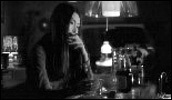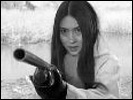Jeans Blues
- Year
- 1974
- Original title
- Jiinzu Burusu Asunaki Buraiha
- Japanese title
- ジーンズブルース 明日なき無頼派
- Director
- Cast
- Running time
- 91 minutes
- Published
- 17 May 2008



by Tom Mes
Held in high regard in certain circles in Japan but dismissed by a lead actress who was then growing tired of a career in production-line action flicks, Jeans Blues is something of a mixed bag. A simplistic Bonnie & Clyde redux, somewhat clumsily directed by Toei action stalwart Nakajima, it is saved by the kind of unapologetic socio-political backgrounding that was prevalent in the studio's films of the period.
In many ways it's a throwback to the kind of films Meiko Kaji made in her later years at Nikkatsu and her early days at Toei, before Female Convict Scorpion and Kinji Fukasaku crossed her path. She plays Hijiriko, a bored cashier at a swingers' club in Tokyo, who has lost interest in the orgies that take place before her eyes (all of which are shot as cutaways, without the actress present). One evening Hijiriko takes off in a client's car and crashes into Jiro (Watase), a thug on the run from his turncoat buddies, who has five million yen of their money stashed in his jacket. Hungry for a bit of adventure ("Nothing's any fun anymore"), she gets in his car and the newly formed couple drive off, setting into motion a spree of crimes as they cross the country in search of Jiro's sister, with a quartet of vicious hoods on their heels. Events turn desperate when Jiro loses his fortune and the couple have no choice but to embrace their status of outlaws.
Jeans Blues has few qualms about trying to appeal to its audience of hotheaded young men. There is plenty of gratuitous nudity (though characteristically not from the star) and blood flows profusely during the numerous violent action scenes. But although the film is far from the best that came out of Toei during the period, Nakajima and fellow scriptwriter Takeshi Kaneko spice up the proceedings with several well-placed jabs and astute social observations. Both protagonists are kids bored with society, unwilling to follow the road to acceptance and success - and conformity. Having both drifted from job to job, they recognise each other as kindred spirits. When, at some point during their travels, they get hold of a shotgun, they use the Japanese flag for target practice, with Hijiriko laughing excitedly as a close-up of the bullet-riddled red circle fills the screen. Like some of the entries in the Female Convict Scorpion series, notably Shunya Ito's second instalment Jailhouse 41 (Joshu Sasori Dai 41 Zakkyobo, 1972) and Yasuharu Hasebe's Grudge Song (Joshu Sasori Urami Bushi, 1973) the film unmistakably evokes the events at Asama-Sanso - the 1972 hostage crisis recently documented in Koji Wakamatsu's intense United Red Army - with a finale that sees the couple holed up in a mountain lodge surrounded by a police force replete with gas grenades and a squadron of snipers.
Jeans Blues is less accomplished in other departments, but Kaji and her co-star Watase remain eminently watchable, the supporting cast of familiarly gnarly faces from the Piranha Gundan (the tough guy troupe of Toei bit actors, famous for their operatic death scenes) play it to their usual hilts and the film is never anything short of entertaining. Incidentally, there is no one named Jean nor a pair of jeans in sight, though Kaji does look rather fetching in skin-tight leathers. The role proved to be one of the actress' last cosmetic turns, however, as she drastically shifted gears that same year. On the verge of stardom thanks to the Sasori and Lady Snowblood series, as well as several hit singles, she decided to slow down her cinematic and musical output. Kaji turned her back on studio filmmaking, left her agent, and started playing choice supporting parts in films by such eminent directors as Yasuzo Masumura and Kon Ichikawa.